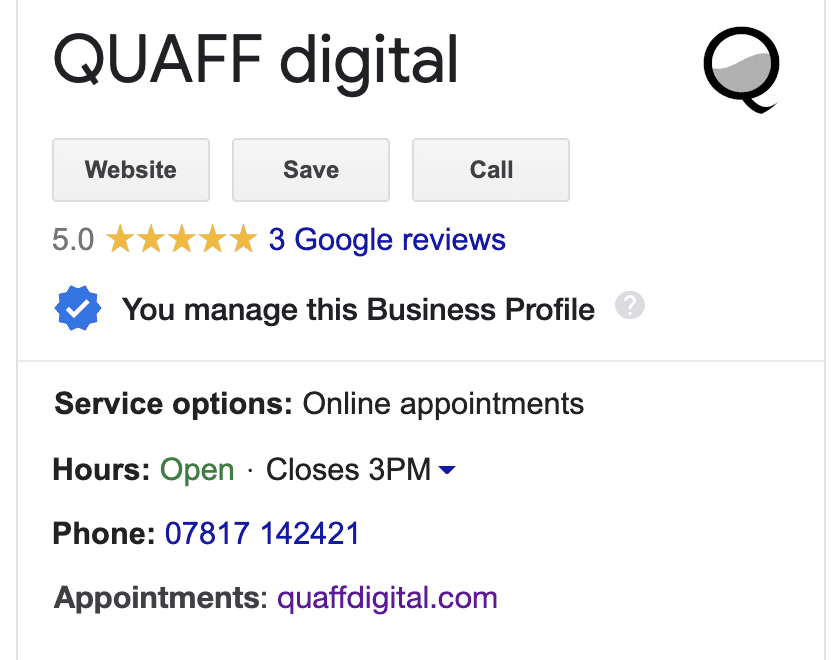There’s nothing worse than impenetrable SEO jargon. Or any jargon at all for that matter. The real rub is that most industries become awash with the stuff because it’s just easier. When you all know what the other person is referring to a quick acronym is fine. The issues start when these acronyms and ‘industry’ words start leaking out to clients or customers.
Assuming your audience knows what you’re talking about is a cardinal sin in business. If you’re on the receiving end It can be difficult or embarrassing to ask for clarification sometimes. You end up feeling alienated. Everyone knows that the sign of an expert is being able to explain something complicated simply.
Jargon is a necessary evil and should be treated as such. SEO jargon doubly so. With that in mind, QUAFF have thrown together a quick list of the most common SEO terms you may have encountered and what they actually mean in plain english.

The SEO Jargon: ‘SEO’
Let’s start with the obvious one! SEO stands for Search Engine Optimisation. A search engine, like Google, is a program that searches for and identifies items in a database that correspond to keywords or characters specified by the user (you).
Think of Google as a library and your input – the words you search for – are the description of what you’re looking for that you give to the librarian. That librarian then goes away and collects all the things they think you may find useful, then brings them back to you for you to look through. Search engines essentially compete to be the most useful ‘librarian’.
SEO is the set of practises that continually alter your online presence to make it as relevant and attractive as possible to these ‘librarians’. This, in turn, increases the amount of times you are presented to a user as a viable, useful, and pertinent match to their search terms. The more you’re shown to users, and the more valuable your content is, the more opportunity you have to do business – in whatever form that may be.
The SEO Jargon: ‘Keywords’ & ‘key phrases’
A lot is made of keywords & key phrases and they’re right at the top of the list when it comes to SEO jargon. From the perspective of a business trying to gain attention online a ‘keyword’ is a search term that applies to them. For example, if you sell jewellery then the obvious ‘keyword’ you think is relevant to you is ‘jewellery’.
Simple, right?
You’d think so, wouldn’t you. The complications arise when you need to take into account more tangential keywords. So, for our jeweller, they may consider the materials they work with (‘gold’, ‘silver’, ‘diamonds’ etc) may also be keywords for them. They may also need to consider what style of jewellery they make and incorporate that in their keywords, too (‘maille’, ‘gothic’, or ‘wedding’ for instance).
On top of this you have local SEO to consider and this is often where ‘key phrases’ come into play. Focussing on ranking for ‘Jeweller near me’ or ‘best jeweller in Balsall Common’ may be very important for an independent, local business. This means that their content would need to address these search terms. This can be done in a wide variety of ways, the quickest being the inclusion of the search terms in the website copy (words).
To give you another example, I want this article to rank for, (and be found by) people who want to know what all the SEO jargon means. So I’ll include terms like ‘SEO‘, ‘SEO jargon‘, and ‘what does SEO stand for?’ throughout my copy to make sure the librarians (search engines) consider what I’m writing to be valuable to people looking for answers to these questions.
Incidentally, if you’d like to know who we think is the best jeweller in Balsall Common – it has to be Fleur from Rocks n Chains.
The SEO Jargon: ‘White hat’ & ‘black hat’ practises
Like most industries ours has certain rules and regulations we must follow when carrying out our professional duties. Those who abide by these rules and terms & conditions are said to be practising ‘white hat SEO’.
There are practises that go against these rules and regulations that are considered ‘black hat SEO’. These include things like ‘keyword stuffing’. This is the practise of filling every bit of text with keywords that detract from the context or value of the text as a whole. For example, if I were to title this piece ‘SEO Jargon Buster’ and proceed to just type out 100 keywords and key phrases with no effort to produce any meaningful content that would be classed as ‘keyword stuffing’.
Black hat practises have real-life consequences, too. If your site falls foul of these rules and regs you can face a Google penalty. These can vary from Google suppressing your content so it doesn’t appear on the first few pages of any search, to actively making your content and site invisible to users. These penalties are only lifted when there is evidence of black hat practises being removed. This is one of the reasons it is vitally important to do your due diligence when selecting a business to work with on your SEO.
The SEO Jargon: ‘Backlinks’
A ‘backlink’ is a hyperlink that leads to your site from a third party site. The simplest example is to look at the link I inserted above to Rocks n Chains. That is a link to Fleur’s site from a third party site, a ‘backlink’. Backlinks are important when it comes to increasing things like ‘domain authority’. They help provide search engines with ‘evidence’ that your site is useful and valuable to other users. If another website/user/business is happy to direct their audience to you directly then your content must be useful and valuable.
Backlinks are a double edged sword, however. On the positive side they can provide a great stream of pre-qualified, eager users that want to consume your content. They’re very valuable and can take an awfully long time to cultivate, making them a precious commodity.
On the other hand they are perhaps the most abused element of SEO in terms of black hat practises. Any external link to your site is considered a backlink so if you hire a shady business to do your SEO and they return 10,000 backlinks in a month you may well begin to question how they managed this. These links could be absolutely anywhere – I’ll allow your imagination to do the work on this one.
Backlinks are ranked in terms of quality by search engines, too. A backlink from a social media platform is always a strong opener as the platform has lots of users, very high domain authority, and is a trusted, valuable source of content for people. That would score very highly and be another indicator to search engines that your website is trustworthy, valuable, and should be served to users. A backlink from a website specifically set up to host nothing but lists of millions of backlinks have very low domain authority, very low traffic, are often not secure, and are not valuable to users. These will drag your score down in the eyes of a search engine and too many could result in a Google penalty.
The worst part? You can’t remove them yourself. You can contact the website owners (if you can find out who that is) and ask, but the chances are you’ll be ignored. You can, however, disavow them using your Google Search Console functionality. Here’s a walkthrough of how to do that.
The SEO Jargon: ‘Traffic’
The amount of users that land on your website is referred to as your ‘traffic’. It can also be referred to as your ‘audience’ or ‘users’.
The SEO Jargon: ‘SERPs’
SERP stands for ‘Search Engine Results Page’. So if you Google anything at all you’ll be ‘served’ SERP 1. Aiming for ‘page 1’ or ‘SERP1’ is to have your content shown on the first page a user sees as a result of their search term.
The SEO Jargon: ‘Served’
I’m not sure why but search engines don’t ‘provide’ the results, they ‘serve’ them. Maybe I should alter my librarian analogy to a server 🤔

The SEO Jargon: ‘Ranking’
‘He ranks higher than any in Rome!’ If you didn’t laugh at that you really must watch Monty Python’s ‘Life of Brian’.
Ranking refers to the position on a SERP your content achieves in relation to the search terms input by a user. How relevant, valuable and pertinent your content is will directly impact your ranking position. The ‘end game’ for all SEO is to increase or maintain ranking positions.
It should be noted at this point that several things will affect rankings that you have little to no control over. The first is Ads. They get shown at the top regardless of how good your SEO is. The second is knowing where you ‘should be’. There is a danger of spending a fortune to rank for a keyword or key phrase that is being monopolised by someone like Amazon. You’re unlikely to win that war, especially in the long term. Choose what you want to rank for but be smart and allow your expectations to be managed.

The SEO Jargon: ‘Content’ vs ‘Copy’
Content is the ‘stuff’ on your website that a user can interact with. This includes videos, images, forms, words – all of that. Copy is just the words.
The SEO Jargon: ‘GMB’ – Google My Business
GMB is great for local SEO. A GMB looks something like this;

To avoid an even longer page I’ve just taken a quick screenshot there. Your GMB displays all the information a user needs to get in touch with your right away. It displays pictures you’ve uploaded, FAQs, Google reviews, a link to your website, contact informations and your location.
GMB is so important that in a study carried out recently it was found that 72% of local searchers visit a local store within 5 minutes of searching for, and being served, the GMB of that business.
If you haven’t set up yours yet, follow this link.
The SEO Jargon: ‘Domain Authority’
Domain authority is a search engine ranking score developed by Moz (don’t worry, you don’t have to know who that is). It is a prediction on how likely a website is to rank on SERPs.
It is important to understand that DA itself is not a ranking factor used by Google, rather a prediction made by a third party based on the relevant SEO information to hand.
I could write loads on this but Moz themselves have phrased it much better than I could. For an in-depth look at DA from the people who made it click here.
SEOJBC!
Or in plain english, SEO Jargon Buster Complete! This is by no means an exhaustive list, I’ve met people who make acronyms about their sandwiches for crying out loud, but it should cover the basics for you so you know what is being done on your behalf.
If you’re still completely lost and just want someone to tell you what needs doing and do it, give us a call.






0 Comments